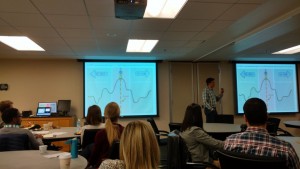 This post was written by Xander Kent, a third year dual Masters of Environmental Management and Business Administration (MEM/MBA) candidate at Duke’s Nicholas School of Environment and Fuqua School of Business. Xander has helped lead the Net Impact Club and has been actively involved in social impact throughout his time at Duke. In his spare time Xander is an avid chess player, outdoorsman, and salsa dancer. Post graduation, Xander will be joining Amazon as a Packaging Innovation and Sustainability Manager.
This post was written by Xander Kent, a third year dual Masters of Environmental Management and Business Administration (MEM/MBA) candidate at Duke’s Nicholas School of Environment and Fuqua School of Business. Xander has helped lead the Net Impact Club and has been actively involved in social impact throughout his time at Duke. In his spare time Xander is an avid chess player, outdoorsman, and salsa dancer. Post graduation, Xander will be joining Amazon as a Packaging Innovation and Sustainability Manager.
Stories are an old, possibly even outdated, way of communication to some. Much like handwritten letters, stories have been replaced by 162 character limits, news-bites, and single tag lines. Despite this, stories remain the foundation of how we relate to one another and provide a much deeper way to connect to another person than the modern mechanisms of social media.
Many at Fuqua have realized this and a critical mass at the business school has been abuzz with storytelling this year. The school has been impassioned by how stories can be used to create community, personal reflection, and shared understanding. This has led to many events and gatherings focused on storytelling this past year.
Central to thi s desire to teach effective storytelling was a workshop that CASE sponsored centered around the art of storytelling. Led by Jeff Polish of The Monti fame, the workshop focused on how the content of the story is second to why the content matters, what impact it has on the storyteller, and how much the content can be relatable to another.
s desire to teach effective storytelling was a workshop that CASE sponsored centered around the art of storytelling. Led by Jeff Polish of The Monti fame, the workshop focused on how the content of the story is second to why the content matters, what impact it has on the storyteller, and how much the content can be relatable to another.
A story, in order to be effective, must create this relatability among the teller and the listener. The relatability is called the transport zone. It is the place you connect with the storyteller and for a brief instance you share a perfect understanding of the world as it relates to the story. If a story is a sandwich, the content is the middle (the good stuff), but it is certainly held together and made transportable by the bread around it in a strong beginning (why should I care?) and end (what impact did it have?).
One of the biggest culminations of both how storytelling has effected the business school and this workshop is an event that the Net Impact Club is hosting April 22nd from 7pm-8:30pm “Behind the Mic Night: Stories worth Sharing” in Geneen Auditorium. This event will include students and professors sharing personal stories around a central theme. As it is Earth Day the event’s theme will be “The Grass is Greener: Stories from the Other Side.” This will be interpreted by the student and faculty storytellers as they see fit in their 7-10 minute story.
In my talking with storytellers, I have already heard of one student getting lost in Vietnam and a professor telling a deep life lesson through cow dung.
If you would like to join us for an evening of storytelling action, you can find the details on our Facebook page or email us at lauren.e.day@duke.edu or Xander.kent@duke.edu. This event is free but we will be encouraging donations throughout the night to help support the Summer Internship Fund which goes to support students pursing underfunded internships with an aim toward social impact.
Please join us to hear the story of Fuqua, Net Impact, and CASE told 7-10 minutes at a time.
